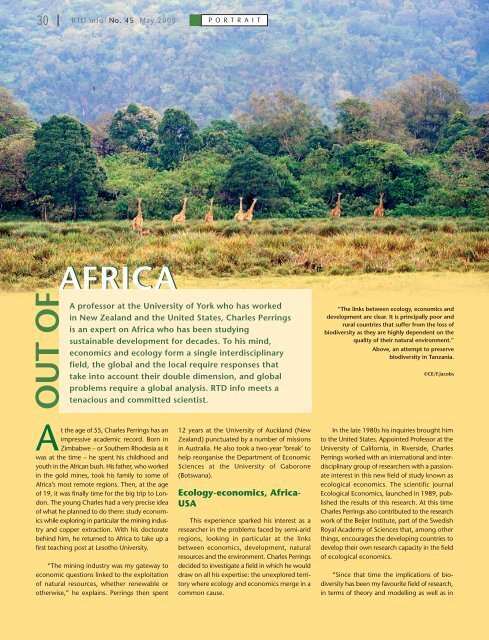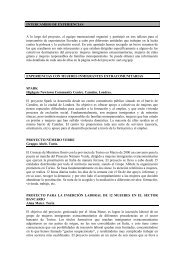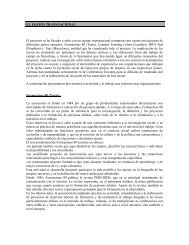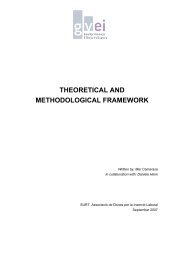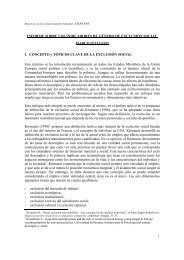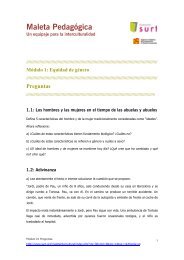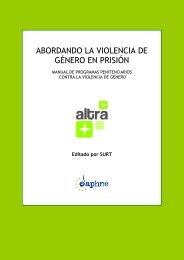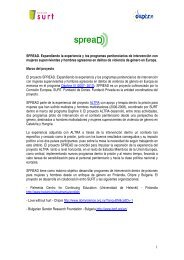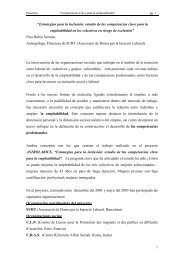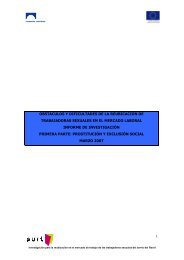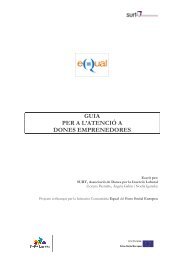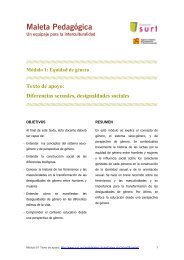30 <strong>RTD</strong> <strong>info</strong> No. 45 May <strong>2005</strong> P O R T R A I TAFRICAA professor at the University of York who has workedin New Zealand and the United States, Charles Perringsis an expert on Africa who has been studyingsustainable development for decades. To his mind,economics and ecology form a single interdisciplinaryfield, the global and the local require responses thattake into account their double dimension, and globalproblems require a global analysis. <strong>RTD</strong> <strong>info</strong> meets atenacious and committed scientist.OUT OFAFRICA“The links between ecology, economics anddevelopment are clear. It is principally poor andrural countries that suffer from the loss ofbiodiversity as they are highly dependent on thequality of their natural environment.”Above, an attempt to preservebiodiversity in Tanzania.©CE/F.JacobsAt the age of 55, Charles Perrings has animpressive academic record. Born inZimbabwe – or Southern Rhodesia as itwas at the time – he spent his childhood andyouth in the African bush. His father, who workedin the gold mines, took his family to some ofAfrica’s most remote regions. Then, at the ageof 19, it was finally time for the big trip to London.The young Charles had a very precise ideaof what he planned to do there: study economicswhile exploring in particular the mining industryand copper extraction. With his doctoratebehind him, he returned to Africa to take up afirst teaching post at Lesotho University.“The mining industry was my gateway toeconomic questions linked to the exploitationof natural resources, whether renewable orotherwise,” he explains. Perrings then spent12 years at the University of Auckland (NewZealand) punctuated by a number of missionsin Australia. He also took a two-year ‘break’ tohelp reorganise the Department of EconomicSciences at the University of Gaborone(Botswana).Ecology-economics, Africa-USAThis experience sparked his interest as aresearcher in the problems faced by semi-aridregions, looking in particular at the linksbetween economics, development, naturalresources and the environment. Charles Perringsdecided to investigate a field in which he woulddraw on all his expertise: the unexplored territorywhere ecology and economics merge in acommon cause.In the late 1980s his inquiries brought himto the United States. Appointed Professor at theUniversity of California, in Riverside, CharlesPerrings worked with an international and interdisciplinarygroup of researchers with a passionateinterest in this new field of study known asecological economics. The scientific journalEcological Economics, launched in 1989, publishedthe results of this research. At this timeCharles Perrings also contributed to the researchwork of the Beijer Institute, part of the SwedishRoyal Academy of Sciences that, among otherthings, encourages the developing countries todevelop their own research capacity in the fieldof ecological economics.“Since that time the implications of biodiversityhas been my favourite field of research,in terms of theory and modelling as well as in
P O R T R A I T<strong>RTD</strong> <strong>info</strong> No. 45 May <strong>2005</strong>31applied fields relating to semi-arid or humid zones. The links between ecology,economics and development are clear. It is principally poor and ruralcountries that suffer from the loss of biodiversity as they are highly dependenton the quality of their natural environment. Rich and urban countriesare much less dependent on the services rendered by ecosystems.”This intellectual cross-fertilisation between the natural and socialsciences produced a number of concepts that transcend disciplinary barriers.“Our discussions with ecologists enabled us to identify the conceptof resilience, which is a means of expressing a system’s stability. Resiliencegives the degree of disturbance ‘needed’ for a system to become unbalancedand evolve towards a new field of stability. This is a very usefulnotion when thinking in terms of the sustainability of systems, both naturaland economic.”A new science of globalityThirteen years ago, Charles Perrings took up residence at the Universityof York, where he founded the Environment Department. The studiesat all levels (degree, master’s degree, doctorate) are aimed at combiningthe economic and ecological approaches to the environment and itsmanagement. “These interdisciplinary studies are not easy. The conceptualapproach and methodologies of economists and ecologists are stillmarked by very different scientific traditions. To draw maximum benefitfrom this interdisciplinarity, you need to beable to integrate these differences and changethe frames of reference during your work.”“I am calling for thecreation of a new science…That is what is needed totackle the global problems thatpay scant regard to our dividinglines – geographical, intellectual,political, institutional orwhatever.Charles Perrings stresses the difficulty of such a marriage. It isalways difficult to overcome the barriers between disciplines, but thereis so much at stake in the field of sustainable development that this kindof ‘crossed’ approach is essential. This new interdisciplinarity is at presentbeing developed – with Charles Perrings’ assistance – at Arizona StateUniversity (USA).“I am calling for the creation of a new science…That is what is needed to tackle theglobal problems that pay scant regard to ourdividing lines – geographical, intellectual, political,institutional or whatever. We must find thebest local responses and the best combinationof them to influence the course of events atglobal level. All of this also requires a real applicationof international conventions and of therules of world trade.”But how can the policy-makers be made tounderstand this? It is difficult to persuadeproviders of funds, who often focus on nationalor regional interests, to support research on alarge scale. Some scientists are neverthelessmanaging to make their message heard inpolitical circles without sacrificing their independence.“This credibility is based on honesty.There is nothing worse than experts who exaggeratetheir case in order to be sure of makingtheir point.”Professor at the Universityof York (Department of theEnvironment), CharlesPerrings is Vice-Presidentof the Scientific Committeeof the Diversitas, aninternational scientificprogramme devoted tobiodiversity, and Presidentof the International Societyfor Ecological Economics.He is also an advisorto many governments,non-governmentorganisations and researchfundingbodies, and editorof several scientific journalson ecological economics.His works include Economicsof Ecological Resources:Public goods, global usersSelected Essays, publishedThe problems studied by Charles Perrings allin London by Edward Elgar,concern the global public goods, but expressed in 1997.at different levels. Biodiversity is one example ofthis. The diversity of genes is a global goodwhile the diversity of pollinating insects and the To find out moreimpact of this biodiversity on agriculture brings 0 www.york.ac.uk/depts/eeemmuch more local benefits. “Investments for itspreservation are alwaysContactunder-valued. The way0 cap8@york.ac.ukin which local responsesinteract with the internationalnature of the public good should be the subjectof a whole field of inquiry.”But how should the global community be representedin terms of governance? It is this thatmust encourage research leading to the drafting andapplication of international agreements. Perrings,who has held posts with a number of institutions,is familiar with the subject. “The problems haveevolved much faster than the institutions that aresupposed to deal with them. Most of the time theyhave a national vision, one with its origins in the 19thcentury. Such a collective, global decision-making body does not exist,at least not yet, but it seems to me that the UNEP (United Nations EnvironmentProgramme) should take on this role. There are enough qualifiedindividuals with good intentions to work on these questions. The realproblem is more the political agenda of countries that are genuinelyable to stimulate this international co-operation.” So is he an optimistdespite it all? “Where there’s a will there’s a way…”.“


